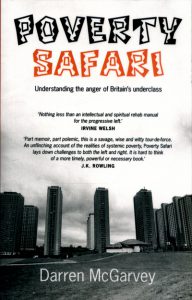 Kewakawa, New Zealand I’d seen a positive review of Poverty Safari: Understanding the Anger of Britain’s Underclass by Darren McGarvey, so I put it on my list for vacation reading. My interest was particularly piqued because he was focusing on Glasgow, Scotland, where our organizing is making strong progress, and I had recently spent time with Sean Bailie, our organizer there.
Kewakawa, New Zealand I’d seen a positive review of Poverty Safari: Understanding the Anger of Britain’s Underclass by Darren McGarvey, so I put it on my list for vacation reading. My interest was particularly piqued because he was focusing on Glasgow, Scotland, where our organizing is making strong progress, and I had recently spent time with Sean Bailie, our organizer there.
It was an interesting book, though not what I might have expected or hoped to read. There were flashes of real insight.
Here’s McGarvey on gentrification:
“The term ‘gentrification’ simply means people with more money than you, but not more money than people with money, are being invited to set up shop in your area on the cheap, in the hope that their presence will lift you a little out of the gutter.”
Here’s another a couple of pages later that amplifies his points:
“It’s an understatement to say that many have become angry, disillusioned or apathetic after years of feeling ignored, dismissed and bullied by agencies and institutions speaking in the medical jargon of regeneration. There’s a feeling in sections of these communities, among those who want to actively participate, that things are not done with the community but to it.”
McGarvey is also excellent in his critique of the “poverty industry” and its self-interest trumping any concern for the community. He’s “right on” when he talks about the need for responding to the “voice” of the community and listening to what people who live in the housing estates and neighborhoods like his own Pollack. Reading his sympathetic case stories about the organizational struggles to protect the area are a tale of good, active work, and his respect for the organizers is palpable. In short, there’s enough in the book that makes it worth the read and every time he runs into the swamp, usually dry land isn’t far away.
At the same time the book is troubling. This is a personal story couched in a political one, and invariably the personal story sucks out the rest. The personal story is also one that never finds totally solid ground. McGarvey likes to step forward, but also sidle back enough to protect his ass, to concede the same ground he just took, to claim as quickly that he might be as wrong as he is right. The reader can never be fully sure where he stands.
He defends this as a mixture of personal maturity and growing empathy with other points of view, people, and classes. His personal politics has run from socialist to maybe liberal, but really to nothing for sure anymore. His platform now is Bill Clinton’s. He advocates personal responsibility first and foremost while systemic issues, class, and politics for him has become more a two-handed situation, on the one hand this and on the other that. He is portrayed as being a voice of the working class, but his book never talks about work or workers, their culture or values except when it collides with his personal story. This is a story of “uplift,” as Ibram Kendi called it in Stamped from the Beginning about race. McGarvey wants to be seen as one of the survivors who managed to escape from the muck and mire.
All of which leaves me wondering about what audience the book was written for? Not for me and his fellow Glaswegians for sure despite the parts we might find spot on. It feels written for the folks in the next rung of the ladder he’s climbing, not those of us who would have been glad to hold his ladder steady from the bottom as he looked around and spread the word.